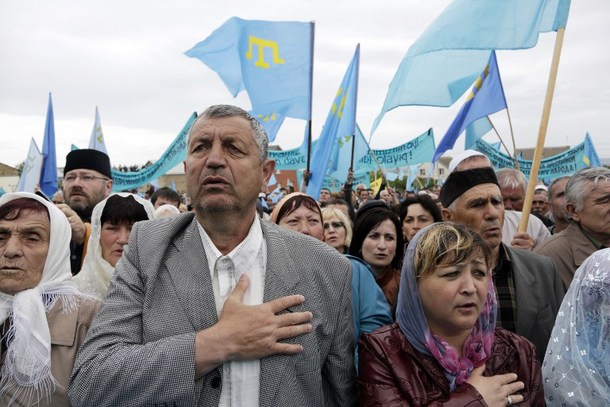
Moscow Launches Second Effort to Marginalize Crimean Tatar Mejlis
Publication: Eurasia Daily Monitor Volume: 11 Issue: 191
By:

Because the Crimean Tatars and their assembly, the Mejlis, have opposed the Russian Anschluss of their homeland since the beginning, Moscow and the Russian occupying authorities on the Ukrainian peninsula have attempted to break it by banning some of its leaders, harassing others, and raiding its premises (see EDM, September 23). But these efforts not only have not eliminated the Mejlis as the most influential institution among the Crimean Tatars but backfired on the Russian side, attracting international attention both to the plight of that nation and to the thuggish nature of the Russian occupation more generally.
Consequently, the Russians are shifting strategies, seeking to marginalize the Mejlis by creating an alternative pocket organization of Crimean Tatars, which they can control and will seek to present to the world as the “legitimate” representative of the Crimean Tatars. At a minimum, the Russian occupiers hope that they will confuse and divide the Crimean Tatars and muddy the waters among outsiders—particularly, given the propensity of Western journalists to give equal time to such groups out of a misplaced belief that “balance” equals “objectivity” (see Hot Issue, August 13). But an examination of the statements of the leaders of the new group shows just how little support they have and how inflated are their claims.
The latest effort to push the Mejlis aside began at the end of September, when Sergei Aksenov, at that time the acting head of the Russian occupation regime, dismissed the Mejlis in comments to the Moscow newspaper Kommersant. “From a legal point of view,” he said, the Mejlis “does not exist for me. What mejlis are we talking about? The organization has not been registered in the proper way. Therefore, it does not exist.” According to him, the body, despite being recognized internationally and in Ukraine as the collective spokesman for the Crimean Tatars, is backed by only “15–20 percent of the Crimean Tatars” because, in his words, “the Mejlis has not fulfilled any of those programs, which have been declared in Ukraine since 1991” (Kommersant, September 22).
That was followed by the announcement of the formation of a new group, the Kyyrym birlingi, which had the backing of the Milli Firka, a longtime opponent of the Mejlis and its leadership and which is registered with the occupation authorities. The new group presented itself as “an alternative” to the Mejlis and openly appealed for Crimean Tatars, both within the Mejlis and more generally, to desert the Mejlis and join with it under the conditions of the new order in Crimea (nazaccent.ru, October 24).
Now, the leaders of this group, including Seytumer Nimetullayev, have taken the next step and declared that their group has the support of “about 50 percent” of Crimean Tatars. They can provide no evidence for this claim, but these remarks are, nevertheless, likely to be cited by Moscow and its supporters elsewhere as clear evidence that the Kyyrym is the wave of the future and the Mejlis is a relic of the past.
In a simulacrum of objectivity, Nimetullayev said that about 50 percent of Crimean Tatars still support the Mejlis but said that “with every day and every hour,” the balance is shifting away from the Mejlis and toward the Kyyrym. “People understand that it is necessary to live, that there is no other path, because children are being born, growing up and studying.” He pledged to “do everything” so that the Crimean Tatars will live “much better in the Russian Federation than they did before this” (qha.com.ua, October 23).
The Kyyrym head said that he would not be able to say exactly how many members and supporters his group had until after the completion of the ongoing census, which supposedly will define just how many Crimean Tatars there are on the peninsula. But that is a highly problematic assertion. For one thing, not all Crimean Tatars are willing to take part in this Russian-orchestrated measure. And second, Russian censuses carried out since Vladimir Putin became president have, in general, been heavily falsified and distorted.
Nonetheless, this Moscow creation has already had some success. Some members of the Mejlis have joined the new group and others are taking a wait-and-see attitude, given that it is unclear whether the Crimean Tatars will be allowed to have any other means of dealing with the occupation authorities in the future. That sense of inevitability and of no alternative to the Kyyrym is being actively pushed by Russian occupation officials and by some Crimean Tatars as well (qha.com.ua, October 27).
But the Mejlis leadership remains united against the new group. Akhtem Chiigoz, a deputy chairman of the Mejlis and the highest ranking member of the organization still in Crimea—both its current and past presidents have been banned from entry by the Russians—dismissed Moscow’s efforts to create an “alternative” to the Mejlis. “An alternative Mejlis,” he said, “could be only a Mejlis elected by direct and secret elections among the Crimean Tatar people […] everything else is simply an attempt at manipulating public opinion” (qha.com.ua, October 27).




